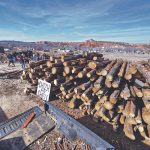
Letters: Chaco fracking is environmental racism
We at Diné CARE have been assisting the far-eastern Navajo communities of Counselor, Ojo Encino, and Torreon with their efforts to bring a clear and fair process for the people living in the Greater Chaco region.
Our view is that the process surrounding the environmental impact study of the amendment of the 2003 Resource Management Plan is a textbook example of how environmental racism is instituted by the Bureau of Land Management and Bureau of Indian Affairs.
While a global pandemic is raging, streamlining the systemic planning for 3,000 fracked oil and gas wells in one of the most sacred landscapes to the Diné people is so unfair we can only call it discrimination. And discrimination stems from racism.
Most egregious is the BIA’s stance that people in the affected communities could “work around” the issue of the global pandemic and lack of broadband internet and log in to a Zoom meeting to participate in the BLM/BIA joint “public meeting,” which has immediate and long lasting impact on the future health of family and community.
This is beyond your run-of-the-mill federal bureaucratic callousness and can only be characterized as cruel. As trustee, this agency is supposedly the people’s main advocate. The protections of the communities are under attack by the Trump administration.
On July 16, the Trump administration’s Council on Environmental Quality amended the National Environmental Policy Act under the guise of “modernization.” This rule change strikes out important definitions of “cumulative,” “direct” and “indirect” impacts.
Most importantly is that “cumulative impacts” analysis is no longer required under federal law, per this rule change. What this means for the Counselor community is there is no longer an ability for local leaders, allottees and allotment holders to call upon any federal agency to consider the past and current sources of environmental stresses in their analysis of planning for 3,000 more oil and gas wells in the region.
The local Navajo leaders are at a disadvantage in seeking to bring safety to their communities because large sections of the lands in the Eastern Navajo Agency are individual Indian allotments and the air quality on those land parcels are not under the jurisdiction of the Navajo Nation.
The Navajo Nation has not formally finalized any actions to exert jurisdiction on the air quality. Currently, all the 100% allottee- and allotment holder-owned parcels are under the New Mexico jurisdiction that is delegated by the U.S. EPA and these lands were not considered for sale under the Cobell Land Buy Back program. The lands with Navajo Nation ownership percentages are possibly under Navajo Nation jurisdiction.
To close, the “de facto” leader of BLM, William Peavey Pendley, has been denounced by New Mexico Sen. Martin Heinrich as an anti-Indian development zealot whose “beliefs are antithetical to the very idea of America’s public lands and … is glaringly unqualified to run the Bureau of Land Management.”
Our people need a process that is fair and just. We call upon our leaders to fight this environmental racism and protect the health of people who cannot protect themselves, the cherished elders and the sweet precious little ones not yet born.
Kendra Pinto
Twin Pines, N.M.
A demonstration of ‘Good Samaritan’
The concept of a “Good Samaritan” has been part of spiritual and medical guidance for many generations. Yet it is seldom that an individual has an opportunity to see and hear someone demonstrating this concept through his actions.
My husband, Allan Scholbrock, and I were blessed to have a Good Samaritan in our lives on Monday, Sept. 14. We were traveling south between Shiprock and Gallup and were about halfway between those two towns. Suddenly, my husband saw a huge smoke emanating from one of the tires on our fifth wheel that we were pulling with our truck.
We immediately called AAA for roadside assistance. They stated they would dispatch a tow truck from Farmington, and would text us quickly. We waited and waited. Two hours passed with nothing from AAA. We then heard a man calling out to us.
Another traveler, John Carlton, a Navajo who resides in St. Michaels, Arizona, offered his help and tools. He spent an hour or more with my husband, removing the badly shredded tire and replacing it with a spare. When we offered a monetary token to him, he stated that was not why he had stopped to help.
What a true Good Samaritan! If our citizens could take a lesson from John, how much better would all of us in this country be? We feel blessed to have met him. He deserves recognition.
Jan Steiner
Scottsdale, Ariz.
Sovereignty and Diné Bi Beenahaz’aanii
The Navajo Nation leaders should never compromise its sovereign status, because it belongs to the people. Any proposed changes in the future will have to be supported and approved by the people as a prerequisite. Sovereignty has always belonged to the people and it can be said it goes back in time before European contact and the people evolved with it that made them distinct and different from others.
The Navajo people inherit this understanding of sovereignty from their ancestry, and much earlier. The people were completely independent and self-determined long before the encroachment of any foreign country or influence to Navajo country.
When the U.S. government entered into the 1848 and 1868 treaties with the Navajo people, they recognized this pre-existing aboriginal sovereignty that was culturally pragmatic and already with the people’s action as a way of life.
It is clear from this understanding the inherent sovereignty of the people was not a grant from the U.S. government to the Navajo people by treaties, but a recognition of the original sovereignty that were with the people from time immemorial.
The sovereignty of the people has since become residual over the years and needless to say, it has severely diminished.
When the concept of sovereignty came to Navajo country, leaders had to come up with a Navajo concept or description that metaphorically attempted to define and discuss sovereignty by using Navajo cultural lens and consciousness.
That description came to be expressed by the Navajo words, Naats iiliid Nihinazt’i’, and thus it became the Navajo description to discuss sovereignty. Naats iiliid refers to rainbow and Nihinzt’i’ refers to “we are enclosed by rainbow.” Today, it is widely used in Navajo political and legal circles on the Navajo Reservation when sovereignty is discussed, especially when it comes to federal and tribal relationship and federal entitlements.
Today, sovereignty among Native people seems to be more discussed within political and legal parameters with external entities and less emphasis on the root and inherent authority of indigenous people to govern themselves within the borders of the United States.
The Navajo Nation has yet to realize its true aboriginal sovereign existence. The Navajo Nation promulgated the Dine’ Bi Beenahaz’aanii, (Dine’ Fundamental Law), which is now codified in the Navajo Nation Code, and supposedly a 21st Century law.
The Navajo Nation government, rooted in ancient sovereignty, has yet to develop its true meaning of its aboriginal creed. The federal government has developed many policies over the years, sometimes it infringes on the right of Native people to govern themselves, but these policies came and went without denying the existence of sovereignty itself that is rooted in ancient history. Navajo leaders are entrusted by the peoples’ vote to protect our sovereign existence and as our ancestry envision it and a fiduciary trust that must be understood at all times without reservation.
James Henderson Jr.
Gallup, N.M.
I grow hemp and I am not a criminal
I am a Diné Asdzaan, born to the Holy Earth-Surface People. I am a farmer. I have been farming along the river near Tse Da K’aan for 23 years. I grow hemp. I am not a criminal. I am not a drug dealer. I provide for my family as our Holy Ones instructed us to do.
I offer these thoughts on the current turmoil over hemp farming. First, I want to remind our elected leaders and their appointees that Diné Bi Beehaz’áanii is supreme. The actions of the current Navajo Nation Council, the president’s office, the Department of Justice, and law enforcement are not based on Diné Bi Beehaz’áanii.
The actions are adversarial. This is not our system of justice. We have modeled our government on a non-Diné system, but we also have appropriately incorporated Diné Bi Beehaz’áanii as the foundation of our government. Our leaders put Diné Bi Beehaz’áanii into written law. The current leaders are not following Diné Bi Beehaz’áanii.
In 2000, our leaders on the Navajo Nation Council and the president of the Navajo Nation, including the Navajo Nation Department of Justice, changed Diné, the people’s, law to define what was marijuana and what was hemp. The pros and cons were discussed. Our wise leaders debated the legislation and decided that hemp should not be illegal because it was not marijuana. They understood the difference between the two plants. They were informed. They believed science and the experts. They understood the great potential of economic benefit for the people.
The United States was also embracing hemp as an agricultural commodity at that time. The 2018 U.S. Farm Bill legalized hemp in all 50 states as an agricultural product that can be grown and sold by farmers. The regulations for growing hemp are overseen by U.S. Department of Agriculture. In 2018, the Navajo Nation changed Diné law to “conform” with the federal definition of hemp. Again, hemp was defined as not illegal if the hemp plant contains less than .3 percent THC.
The current situation over hemp farming has been made a much larger issue than it needed to be. Our legislative and executive branch leaders neglected their duty to the people when they did not create hemp regulations, as they were responsible for doing. Instead of working toward fulfilling the intent of Diné law, they decided to create conflict.
They decided to criminalize growing hemp. Requiring hemp farmers to obey the Diné law is right. Diné law requires a regulatory system. Where is that? Yet me, a farmer, trying to make a living from hemp is a criminal, deserving prosecution and persecution.
One person made a choice to grow hemp before the regulations were in place. I do not defend this choice one way or the other, but what I know is my life as a farmer is better today than any other time in the past. Hemp farming equals economic development. City Market in Shiprock has seen a 20 percent increase in sales since the farming started. Our own government has not helped farmers at all. Hemp farming has contributed to an increased local economy during a pandemic.
I ask, what has our government done to help farmers? Nothing. Hemp farming creates jobs, many jobs. It would bring many of the people out of poverty and off government assistance. The misinformation and outright lies have been given life by our leaders.
They will not listen to facts. Our leaders should provide regulations, assist and support all hemp farmers into compliance and put in place a training program for the people, so we can hire an all-Navajo workforce. To demonize a race of people is against Diné Bi Beehaz’áanii. If there is something illegal going on with one farmer, then investigate and find out the facts, but do not make criminals out of all hemp farmers and a certain race of immigrants.
Finally, I learned the Navajo Nation Council passed legislation to change Diné law last week in a knee-jerk reaction to the situation. The Council posted the legislation on Sept. 10 with five days for public comment as required by law. The legislation was rushed through three committees, Naabi and the Navajo Nation Council within one week.
The meaning of the legislation as it was posted on Sept. 10 was amended into something vastly different from the floor of the Council in the dark of night. The Council added “civil forfeiture” to penalize anyone growing marijuana (any plant over .3 percent THC).
The Council also made sure to keep the exception for Navajo Agricultural Products Industry to continue growing without a regulatory system in place. The changes to the current law are ill conceived, over-reaching, and are based on inadequate information and facts.
This is a substantive change to the legislation from when it was first introduced. This change affects our property rights. It is a grave dereliction of duty for the Council to do this. How can they pass such legislation, literally in the dark of night, without any public input, expert advice, and facts? Again, a violation of Diné Bi Beehaz’áanii.
They accepted the input of some, but not all. They ignored their own rules of governing. They accepted hearsay as fact. Changing Diné law to punish one person is wrong. Hemp is legal to grow, we just need a regulatory system in place. Our leaders were required to create it. Instead they chose to act outside of our Diné Bi Beehaz’áanii and incite and support the “us versus them” response.
The Navajo Nation government is growing hemp. I can’t. Stop this adversarial approach. It is just not what the Holy Ones intended or instructed.
Sherrell Mesa
Tse Daa K’aan, N.M.
Why not fly the ballots out?
Many communities around the nation share the dilemma of Kayenta, with getting voted ballots turned in on time. We stand together in battling well-funded Republican efforts at voter suppression of rural and Black, Latino and Native American voters, many of which involve the courts. It seems Trump cannot govern without lawsuits all around him.
We also share post office issues, with many people now distrusting sending their ballot through the mail if they have another option. After reading about Kayenta’s special problem in getting the ballots into Navajo County on Election Day, an unreasonable scenario that is being struck down, state by state, this fall, I wish to respectfully offer an idea for a solution to President Nez and the chapter councils. If Kayenta could receive COVID-19 supplies by airlift via Air Serv and Air Bridge, why not fly the ballots out?
If ballots could be accumulated and held at the post office(s), it would be possible for a helicopter to land nearby and load the ballots. A postal employee of moderate weight could board the helicopter so the ballots remain in post office custody the whole way.
The Kayenta postal workers could create a zip tie and tag security locks on the ballot boxes. Best to do this with one chopper, not two. You are going to need a chopper that can carry the weight and bulk of the ballots, not one of these ultra teeny two-person jobs used for flight training.
Now where to find a helicopter? The National Guard has them for sure, but likely the Republican governor would not approve that; the state police and highway department, too — same problem. The county sheriffs have them, too. Not sure about their independence. So commercial helicopters then. There is a vast industry of them based at the Grand Canyon. Even more at Las Vegas, which is much further away.
Sedona also has tourist copters. Flagstaff has commercial copters for rent. Major TV news channels have them, though they may be small, but they might agree to become part of the story, “How the votes arrive from Kayenta.” Exclusive. Film at 11.
There is also the possibility of general aviation, a small aircraft flying Holbrook-Kayenta or Kayenta-Holbrook-Kayenta. Start asking. You might be able to get this funded with publicity. President Nez, you must have the business card of some CNN reporters.
They are on this voter suppression like a hawk on a rabbit. They might do it for the news angle. At the very least, they might get the word out to some wealthy person who would donate this just to get back at the GOP, or out of the goodness of their heart.
Get the news out to the major Arizona stations. Arrange an interview with some elders who are afraid their vote is not going to count. Or veterans. You know what to do.
This could take on a life of its own, but you must act swiftly. You might win in court, but court could drag on until it’s too late to act. If you win, you win for next time, and for the principle. There are wealthy people in California and around the nation who might step in. Work your contacts with Adopt a Native Elder who might know someone who knows someone. I think you can do this. Don’t be the victim, be the clever evader.
I wish you luck. We need Mark Kelly in the Senate the minute he can be sworn in to save our health care. God bless.
Robin Young
Middletown, Va.
Benallly’s actions show he is above law
This letter is being written to express my concerns of the illegal hemp farms starting and existing in the communities of Shiprock, Hogback, and Gadii’ahi.
Mr. Dineh Benally, I respect you in a traditional way and as an individual because your second clan (Water Flows Together) is the same as mine, but what you are doing troubles me greatly and I’m sure a lot of other people have the same concerns.
I have been a voting member of the community of Shiprock for 40-plus years. I am familiar with farming and have enjoyed doing so every spring, summer and fall for over 30 years.
Mr. Benally, you have divided this community over your self-interest, self-promotion and self-greed. You have brought a workforce of Asians to our community to work for you. Some don’t even speak the English language. Are these people here legally?
There are Asians in a white van with California license plates and an Anglo person asking farmers if they are willing to give their farms up for the purpose of growing hemp.
This is occurring on the weekends when the Navajo Nation is on a lockdown because of the virus situation. Do they have the authority or right to do this when our Navajo Nation president is telling us to adhere to the lockdown? These hemp farms have a distinct odor, which is very unpleasant. Is this odor a health concern for people with pulmonary issues such as asthma or chronic obstructive pulmonary disease?
There has also been an increase in traffic. I’ve seen semi-trucks and vehicles with California license plates constantly traveling up and down Farm Road. Mr. Benally, if you care about your community and the people, you will cease the operation of these illegal hemp farms. Respect the farmers and the people of these communities.
Don’t be threatening the people that have farms. I have seen and read the letter that you have sent to some of the farm owners who have let their farms lay fallow. People in elected positions should not use their status for personal gain.
How much profit is being made by the sale of this hemp? Mr. Benally, you don’t have respect for tribal, state, or federal laws. Your actions show that you believe you are above the law.
Another question I have is where are the leaders of these communities? Are they afraid to stand up to Mr. Benally? Leaders were elected by the majority of the community to do a job for the people. Please stand up to Mr. Benally and his hemp operation.
Norman L. Phillips
Shiprock, N.M.
Shiprock overrun by Orientals
Why? Shiprock is overrun by Orientals and most of them drive vehicles with California license plates. They’re paying residents to live on their home sites, they live in a men’s camp, church building, and apartments in Farmington.
They constantly trespass on people’s farm plots and ask permission to put greenhouses on their farm plots, they drive at high speeds on our farm roads, and they’re trashing our farm land, ruining our Mesa Farm Road with overweight trucks.
You encounter them on problems, they do not speak English and display a Chinese language written card with no photo. They’re buying commercial buildings in Kirtland, New Mexico, buying semi-trucks, and getting their hardware supplies in Farmington.
The Native American Agriculture and commerce website by Dineh Benally promises them land of great opportunity on Navajo land. Promise of miles of terrain, infrastructure, unlimited water, unlimited power, labor, land and building leases, foreign trade, opportunity, tax saving, tax benefits, employer benefits, domestic and international import/export, coast-to-coast land and rail, transport via I-40, interstates and routes, domestic and international airports and airstrips.
Encourage to join the movement. Website displays various photos of hemp products. To contact Navajo Nation, Shiprock, USA Las Vegas, Nevada, and Canada, Toronto, Ontario.
Results from this website: We have 23 giant greenhouses and one on grazing area. The movement is going into the state of Arizona. My concern is that they’re running around with no masks.
The state of California is a hot spot for COVID-19. We endured lockdowns and to control COVID-19. We need to send them back from where they came from.
Sammy Ahkeah
Shiprock, N.M.
Court affirmed Diné culture
The Shiprock District Court ordered its preliminary injunction and temporary restraining order against the San Juan River Farm Board president, Dineh Benally.
The court order was to cease his flourishing hemp farms on our reservation. This court decision is an affirmation our Navajo culture through tradition. It is still alive and well.
Strong is our human spirit as it demands social justice and equality, and if the right people are within the system it works. Same as with our ancestral past, our perseverance to live through the storm moves us into the present.
Besides court witnesses, Judge Genevieve Woody’s dominant voice granted peace and quiet back into the interrupted and chaotic lives of affected community members.
Yes, there are still some that arrogantly and ignorantly cling to their fears and fantasies of fate, to get-rich quick fixes from supposedly “hemp” farming. It is with great hope Judge Woody’s court ruling maintains our Navajo perspective and restores tranquility in our society. Not only from her ruling, but there were numerous women on the frontlines making a difference with this hemp case, as well as the pandemic.
To acknowledge a few, Navajo Times reporter, Ms. Arlyssa Becenti; Times intern photographer, Ms. Sharon Chischilly; including protester, Ms. Beatrice Redfeather; and all those who worked in the background.
Our society is based on and is traced back through the female lineage. This clearly defines woman as matriarch standing from the sunrise to bestow identity to one that stands in the center.
They are the life-givers to our society. It has been and will always be with their accord to continue our existence as a people.
As understood, the court issue was not about whether hemp, or covertly, marijuana was good or bad. It also had nothing to do with jobs, economic development, or self-reliance assertions.
As an example, it did not even concern itself with the testimony of one persuaded worker to quit booze and slave on the alleged hemp farms. Mr. Benally’s surreptitious encroachment undertakings further devastated lives, health, and well-being of citizens and our environment.
Mr. Benally used the pandemic as cover and as his alleged hemp farms evolved and immigrant intrusions increased, friction of relationships heated and got louder. His forceful intrusions onto farmlands of the deceased secured more realty for his incoming labor immigrants.
The gestures of Mr. Benally state he has no reverence nor consideration for our Navajo culture and tradition, including Mother Earth. His arrogant bullying approach only shows he has no regard for human life or property, as he desperately attempts the quickest way possible to fill an emptiness within, which contributes to his downfall.
Common sense dictates, here on our reservation, just because there are no codes or regulations on hemp on the rulebooks do not mean it is legal to do whatever one pleases. All it means is such venture and crime are non-existent at the time or have not yet happened. Therefore, no information on regulations and remedy nor prevention.
Then there is no money to pay for the common good as with social infrastructures. For a public servant to abuse his authority whereby uses political maneuvers that bypasses implementing a firm foundation of a business venture with valid documents and paid fees only violates and squanders public trust.
And society, especially Uncle Sam, does not like being cheated out of benefits of their fair share of assets (fees, charges, taxes) through no rules, no regulations, and quick-rich schemes. Nevertheless, these are the signs of the times and it simply constitutes — greed.
From myth to reality, it seems the resolve of the court is to trace the problem back to its origin, where always hungry “ma’ii” is caught in the act with his bag of tricks and excuses. Thereafter, she took into account the cause-and-effect experience and to follow-the-money. The intuitive court decision rendered by Judge Woody was done with simplicity and pure insight. It conveys intelligence and conviction of matriarchs within our social system of culture and tradition.
Robert L. Hosteen
Beclabito, N.M.

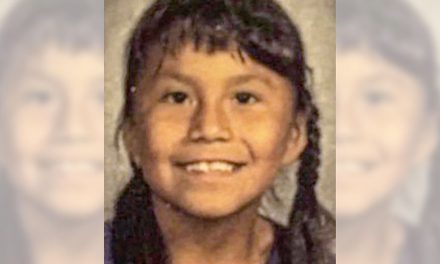
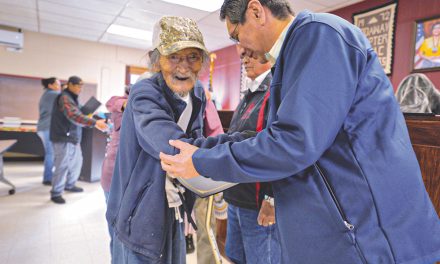
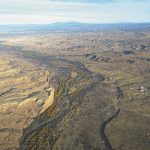
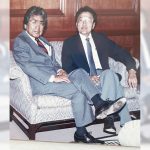



 Highway 264,
Highway 264, I-40, WB @ Winslow
I-40, WB @ Winslow